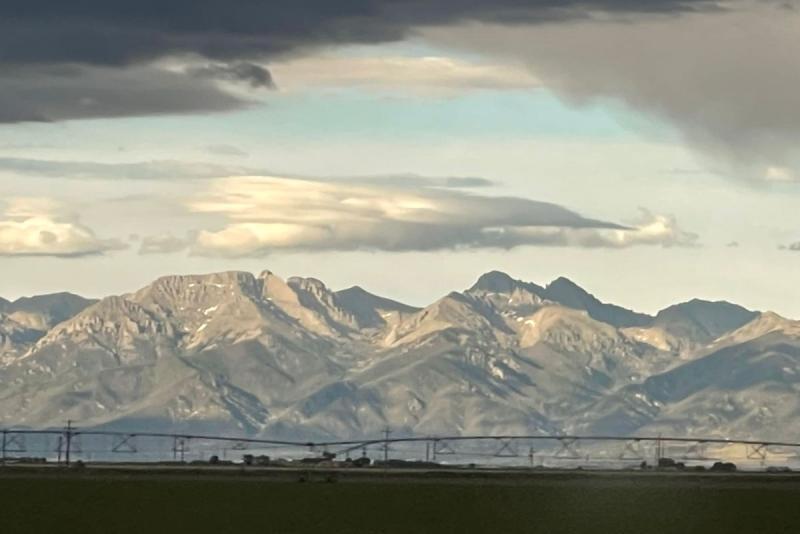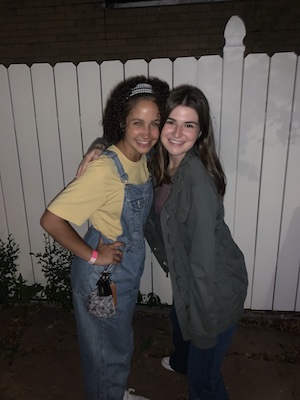Advancing Student Development through Community Partnerships
DUEL Story 5

Photo taken by Zoi Johns.
Project Protect Food System Workers (PPFSW) is a rapid relief organization formed to address issues among the protections of food systems workers in Colorado. Created in March of 2020, the group specializes in four areas: data advocacy, social movement organization, policy action and fundraising. Through these avenues, the group is able to make sustainable change and lasting efforts to reveal the “essential” nature of these workers while securing their dignity, respect and support.
This blog post aims to provide an overview of a collaboration of this organization and DU’s Ethnography Lab. Student researchers Zoi Johns and Gabrielle Hyde worked on the project throughout the academic year, benefiting from both personal and professional growth throughout the process. Because of their interests in migration, health and development, involvement with this organization/partnership seemed perfect to both Johns and Hyde. In the production of literature reviews, timelines and internal documents, Johns and Hyde were able to experience firsthand the value of community partnership in scholarship.
In the beginning of August 2020, while in conversation with two anthropology students in search of a capstone project for their senior year, Professor Alejandro Cerón brought up Project PPFSW. A previous student Cerón had worked with, Kassandra Neiss, was looking to broaden the participation within the organization through creating community partnerships, and reached out to the DU Ethnography Lab from there.
Neiss had reservations about involving outside institutions with the young nonprofit and wanted to maintain PPFSW’s same overarching missions while bringing in outside perspectives. Therefore, when Hyde and Johns were brought onto the project, it was decided that direct access would not be offered to student researchers, in order to best support involved agricultural workers’ safety and privacy. However, they both had the opportunity to interact and interview leadership within PPFSW as they are community members with integral information.
In the beginning of September, Hyde, Cerón and Johns met with Neiss and Damien Thompson, the PPFSW community partners, for the first time. The team outlined general topics and brainstormed deliverables. After receiving direction, Hyde and Johns produced two literature reviews, Hyde on the context informing farmworker health and Johns on the racism embedded in the H2A visa. Throughout October and November, the team met to edit, revise and exchange before turning in our drafts in December and January.
Simultaneously, in late September, Johns and Hyde applied for a grant through the Center for Community Engagement to advance Scholarship and Learning (CCESL) and received the grant in early November. Johns and Hyde attribute much of the projects’ capacity to this grant and acknowledge that the scope of the project would have been severely limited without it. The funds from the grant were used to support the time that Hyde and Johns put into the project as well as tokens of gratitude in the form of PPE to distribute to Colorado’s agricultural workforce — a need identified by the community partners.
At this time, Hyde and Johns transitioned to working on internal documents that would narrate both the structure and process of the organization. Hyde and Johns interviewed six members each of PPFSW asking them questions about the Promotora network (Hyde’s topic) and the racialization of farmworkers (Johns’ topic). The interviews were performed from December through January. The interviews were transcribed and then carefully analyzed for key themes that were determined with the help of Neiss and Thompson.
With these themes, Hyde and Johns outlined the papers, Johns’ paper at 33 pages and Hyde’s at 24, and met again to solidify the intended goal. These documents are not included in the capstone portfolio or publicized elsewhere, as they contain sensitive information from people that wish to remain anonymous.
A timeline for the major events within PPFSW was also made in order to classify their progress and what they had done since the project’s conception. This is an unfinished project, but will be used for future documentation of PPFSW. The first drafts of the internal documents were completed in the beginning of April and were edited and reviewed again before being turned in.
On the 14th of May, 2021, Hyde and Johns submitted their literature reviews, timeline and internal documents to the steering committee, meeting with the entire committee on the 18th of May to present the various deliverables and discuss how they could inform the direction of some future projects, research and data collection.
The internal documents served as a starting point for the steering committee to reflect on their evolution throughout this unprecedented time. There are ongoing discussions about possibly anonymizing and re-shaping the internal documents to be shared either as a blog post through the PPFSW website, or potentially submitted to an academic journal for publication in order to share their insights and accomplishments with others who are interested in working to support the agricultural workforce.
Hyde and Johns attribute much of their personal and academic development to the success of this project. It provided the opportunity to interact with their studies in a way that allowed for an active role in the community while exploring the depths of partnership and scholarship. They have also gained vital experience in both qualitative and quantitative research as well as grant writing, partnership cultivation and community engagement.
With experience in ethnography, Johns is able to look forward in her career towards her master’s degree in International Affairs with a certificate in Global Health Affairs. Additionally, Johns was able to explore future career avenues, even applying and accepting a position with the Colorado Legal Services Migrant Farmworker Division.
For Hyde, this was her first time taking part in a research project and she is grateful for the opportunity to apply what she has learned through her anthropology degree to a real cause within her community. Through the depth of this project, she witnessed the efficacy of community-centered solutions and gained an understanding of the power of collaboration. These are insights that she hopes to take with her as she pursues medical school and the path to becoming a physician.
Hyde and Johns’ involvement with PPFSW has undoubtedly shaped them as students, scholars and stewards in the DU community.



